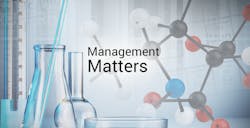Some of my lab clients have hired reps with experience in the pharmaceuticals industry as part of their outreach strategy, and others have asked me what I think of the idea.
It seems logical that when laboratories investigate sales positions, upper management might look favorably on pharmaceutical representatives as potential candidates. The general feeling is these individuals are professionals, they have a sophisticated knowledge of the healthcare delivery system, they’ve had expert training, and they are comfortable calling on doctor’s offices. In fact, I have witnessed several pharma reps integrate very nicely into selling lab services. But are they the exception or the rule?
The following statement, made to me by one pharmaceutical rep-turned-lab-rep, should provide lab directors some insight: “Unless I provide lunch, I find it more difficult with this job to see the doctor. It was far easier when I was selling pharma products. Now, I frequently get road-blocked. And if I’m lucky, I get to speak to an office manager or a medical assistant—it’s tough to get face time with the doc.”
A different business
Let’s step back for a moment to examine the disparities between the two industries. A pharma rep has had extensive training on the company’s product(s). The sine qua non for the rep is to convince the provider that his or her pharmaceutical invention is the best choice for certain conditions (minimal side-effects, superior chemical structure, better clinical trial outcomes, etc.). The marketer attempts to persuade the physician to prescribe the product when it is clinically indicated, either electronically or via a written script. What the doctor needs to do is straightforward, and what the doctor needs to know about the product is clear-cut to him or her as well. It is evident why the physician initially needs to talk with the pharma rep.
Contrast that to what happens after a doctor makes a lab request. Lab testing—as those in the business know—involves a number of constituents and processes: collection supplies, request forms, specimen logistics, patient demographic and test data entry, performing the test(s), returning results (e.g., via EMR interface, fax, etc.), and, finally, billing. Yet many physicians fail to appreciate these many factors. They hold a fairly simplistic view of what labs do: specimen out, report back. A lot of providers regard labs as a commodity and can’t immediately see what there is to talk about with lab reps—especially when things are running smoothly. In the case of hospital ownership of a practice, a competitor rep has a far lesser chance to speak to a highly influential person.
Thus, many potential lab customers will not want to chitchat about a service that they perceive as one-size-fits-all. They may be inclined to talk with a pharma rep about mechanisms of action, medicinal chemistry, and other scientific attributes, but not feel the need to talk with a lab rep. In other words, lab reps may have a harder time getting their “foot in the door” when the incumbent lab works as expected. What they are selling is a tougher sell—or at any rate, a more complicated one.
(Additionally, if the pharma company provides free samples that the doctor must sign for—well—why wouldn’t he or she be willing to take a few moments to speak with a rep! It’s a classic defining moment of quid pro quo!)
A complex sale
In the world of sales, a “complex sale” is defined as one in which there are multiple people providing input about selecting a product or service, and they need outside expertise and guidance to make a quality buying/selection decision. This suggests another difference between pharma sales and marketing lab services. In pharmaceutical sales, the provider—and only the provider—chooses to write a prescription for a certain drug. The decision is usually his or hers alone. But the laboratory sales decision-making process usually involves several individuals within an office/clinic setting.
Most offices have a “preferred” lab—even if they don’t draw blood on-site. In some situations, the patients may be told to “go to the lab where you normally go” (taking into account certain sole-source insurance lab contracts or patient preference). However, decisions can be more pointed with specimens obtained inside the office (e.g., cultures, biopsies). For example, in the case of Medicare patients, the specific lab requisition someone chooses (paper or computer) provides a strong indication as to which lab the doctor (or office) favors. This question about Medicare patient referrals is very appropriate to ask when collecting initial client background information from a no-draw customer.
Typically, the office manager has input; so might medical assistants, clinical managers, nurse practitioners, physician assistants, phlebotomists, and, possibly, even the person in charge of billing. Numerous staff members can offer their opinion (positive, negative or indifferent) about using a certain lab. Sometimes the final decision-maker (typically a physician, but not always) delegates the decision-making process to a trusted staff member. But this is evident: everyone in the office has a subjective thought about the labs the office uses and may give voice (some louder than others) to their opinion. Depending on the decision-maker’s attitude and the value he or she places on employees’ views, a conclusion to use a certain lab will bubble to the top. This intricate situation simply does not occur within pharmaceutical sales, so reps with a pharma-sales past probably will not be prepared for it.
Going deep
If they are going to be successful, representatives with past pharmaceutical experience—and, in fact, all lab sales reps—need to “go deep” within a doctor’s office to engage and build rapport with many staff members. One effective way to break the ice is through an education-based strategy. Reps can offer information that describes the significance of a certain test or profile the rep’s lab performs. They can show their lab’s recent newsletter, or an announcement from the CDC, FDA, or CMS that has direct relevance to the provider’s specialty. They can provide updated clinical guidelines pertinent to that specialty—or a test algorithm for a specific disease—or a relevant clinical abstract.
The material the rep uses should be viewed as valuable information to the client. Additionally, part of its significance should lie in its use as a vehicle to build relationships that demonstrate the lab can be a “valued partner” with the office staff and providers (i.e., not just a “trusted vendor”). In effect, the rep is saying, “I understand your world. I’m not here to waste your time. My aim is to keep you informed, offer helpful suggestions, describe some differences my lab offers, and (for current customers) handle any lab issues you may have.” People typically like—and expect—that kind of attitude and support from a field representative. Yet, creating a valued partner rapport with the office staff may not be top-of-mind for lab reps, and it can be a very foreign strategy for pharmaceutical reps attempting to make the transition.
For hiring managers within the lab testing business, interviewing pharmaceutical reps can be worth the time and effort. However, lab leaders should be aware that these candidates have been familiar with waltzing into offices with pre-authorized license to see the provider without much push-back. Their primary responsibility has been to convince one person—with no other personnel or significant logistical issues to obstruct their objective.
During the interview process with a pharma rep, it is wise to spell out the fundamental differences between the two sales responsibilities. Some job candidates may find the position not amenable to their experience, skill-set, or personality. It’s only fair to the candidate—and less costly for the lab—to determine his or her capacity to effectively do the job during an interview—as opposed to several months into the position!

